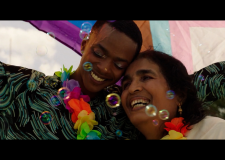Brighton academic debates how we care for the elderly and disabled
An old problem – Marian Barnes leads the discussion about the way we care for the elderly and the disabled

Marian Barnes, professor of social policy at Brighton, and her fellow researchers at the university, have called for a fundamental rethink about the ethics of caring. They said that this was vital to prevent the abuse of elderly and disabled people. They were speaking about their findings at the university’s Falmer campus just over a week ago.
They said: “Care has been devalued in current policy. Not only are care workers poorly paid and often poorly supported, an emphasis on ‘choice’ for care home residents is often at the expense of how to build good caring relationships.” Leading academics in this field from America and Norway took part in the conference, entitled Critical Care: advancing an ethic of care in theory and practice. Contributors came from across Europe and from New Zealand, Canada and South Africa.
Professor Barnes has also published a timely book, Care In Everyday Life: An Ethic Of Care In Practice. Experts believe the book is making an important contribution to current debates on care as both a value and practice. The book explores concerns about abuse in care settings and personalised care. Professor Barnes argues for care as an essential value in private lives and public policies.
She is part of the academic team at Brighton University which takes on between 50 and 60 social work students a year. About 20 study social work as undergraduates while about 40 study for a masters degree in the discipline. More take part in a course jointly run with Sussex University. With an ageing population, some suspect the numbers may rise.
Those going on to work in the profession face many challenges. Dealing with people suffering from dementia or learning difficulties is not something all of us can cope with. And of course care homes and nursing homes have budget pressures whether they are privately or publicly owned and run. But Professor Barnes believes that we need to raise our game when it comes to those who are most vulnerable. And that now is the time to care.
It isn’t just the elderly who have suffered abuse at the hands of so-called carers. An eleventh member of staff at Winterbourne View, near Bristol, last month admitted ill-treating those in his care. An independent inquiry into Winterbourne View said that residents of the home attended accident and emergency departments 76 times in three years but not a single doctor or nurse raised any concerns. The inquiry report criticised the NHS, police and health watchdogs for not acting on dozens of complaints by patients and their families over five years.
In dozens of care home and nursing home inspection reports, there are references to medication levels that have caused concern in some quarters. The worry is that too many old people, especially those with dementia, are being given a chemical cosh to keep them quiet rather than for sound clinical reasons. Even the Liverpool care pathway, designed to ease the last days and hours of dying patients, has been criticised by doctors here and abroad. One leading NHS neurosurgeon, Professor Patrick Pullicino, said that it was being used to end up to 130,000 lives prematurely each year.
The old and vulnerable victims of abuse, and younger people with learning disabilities, are too rarely able to articulate what’s going on. It can but be hoped that Professor Barnes, her book, her students and her conferences help bring about change for the better.





















